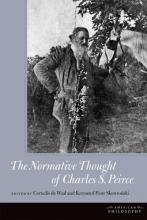News
The Normative Thought of Charles S. Peirce
This volume explores the three normative sciences that Peirce distinguished (aesthetics, ethics, and logic) and their relation to phenomenology and metaphysics. The essays approach this topic from a variety of angles, ranging from questions concerning the normativity of logic to an application of Peirce’s semiotics to John Coltrane’s “A Love Supreme.”
A recurrent question throughout is whether a moral theory can be grounded in Peirce’s work, despite his rather vehement denial that this can be done. Some essays ask whether a dichotomy exists between theoretical and practical ethics. Other essays show that Peirce’s philosophy embraces meliorism, examine the role played by self-control, seek to ground communication theory in Peirce’s speculative rhetoric, or examine the normative aspect of the notion of truth.
Table of contents:
- Traditions of Innovation and Improvisation: Jazz as Metaphor, Philosophy as Jazz / Vincent Colapietro
- Normative Judgment in Jazz: A Semiotic Framework / Kelly A. Parker
- Charles Peirce on Ethics / James Liszka
- Who’s Afraid of Charles Sanders Peirce?: Knocking Some Critical Common Sense into Moral Philosophy / Cornelis de Waal
- Peirce’s Moral “Realicism” / Rosa Maria Mayorga
- Improving Our Habits: Peirce and Meliorism / Mats Bergman
- Self-Control, Values, and Moral Development: Peirce on the Value-driven Dynamics of Human Morality / Helmut Pape
- Why Is the Normativity of Logic Based on Rules? / Ahti-Veikko Pietarinen
- Unassailable Belief and Ideal-Limit Opinion: Is Agreement Important for Truth? / Mateusz W. Oleksy
- Normativity of Communication: Norms and Ideals in Peirce’s Speculative Rhetoric / Ignacio Redondo
- Peircean Modal (and Moral?) Realism(s): Remarks on the Normative Methodology of Pragmatist Metaphysics / Sami Pihlström.

